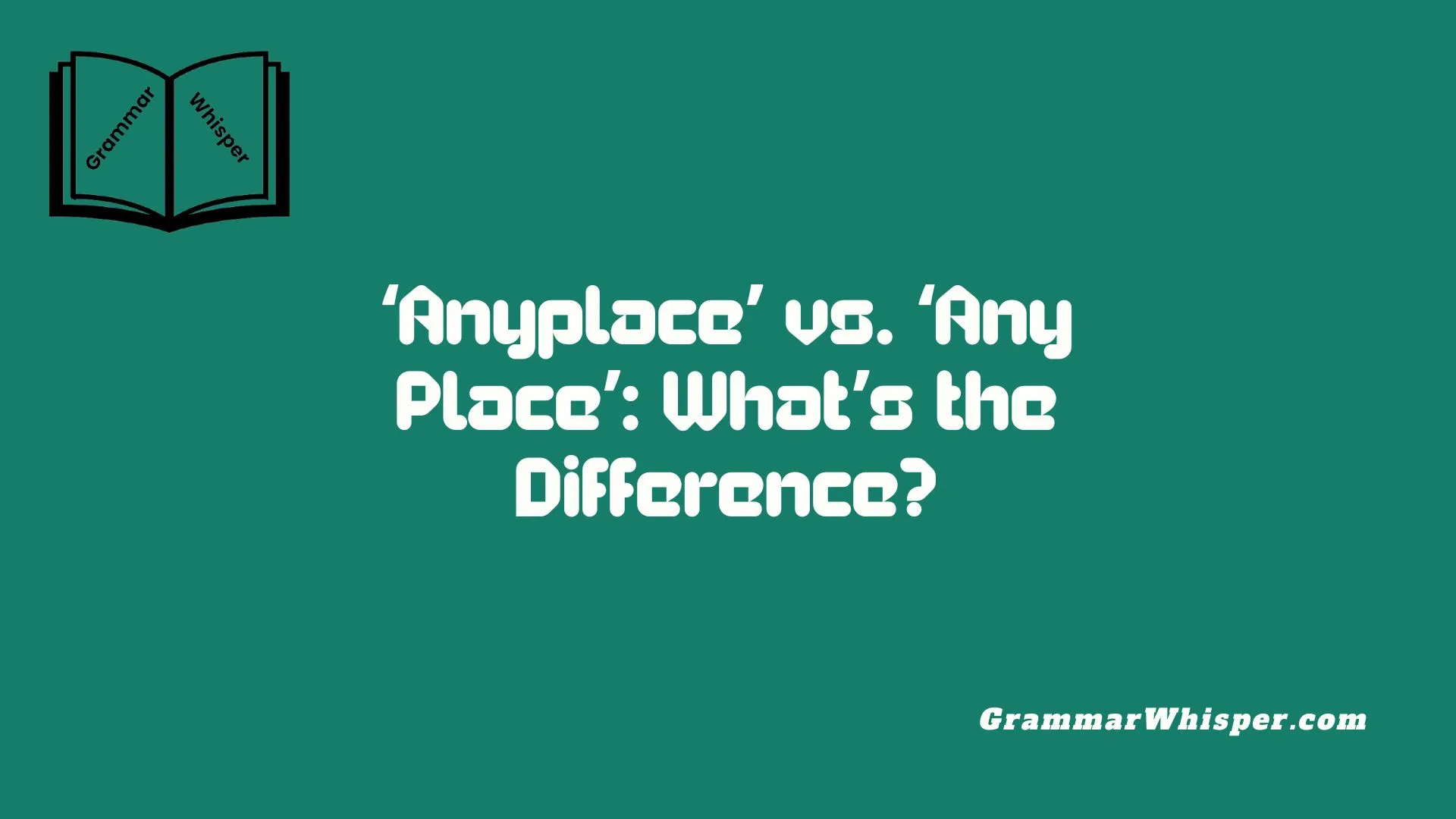When I first began writing professionally, I often paused while typing, unsure whether to use “Anyplace’ vs. ‘Any Place.” They looked similar in meaning, and I thought they were simply used interchangeably. But after studying the tone, formality, and grammatical setting, I realized there’s a meaningful distinction. In American English, the right choice depends not only on correctness but also on how natural-sounding your expressions are in the given context. Informal chats? Go with anyplace. Formal documents or essays? Choose any place – it aligns better with refined, structured writing.
That difference became more obvious as I tried to master precise English usage. This isn’t just about memorizing rules – it’s about understanding real-world patterns. If you’re aiming for clarity and professionalism, let this be your complete guide. Both forms may mean similar things, but they’re not used the same way. In relaxed speaking, anyplace works. But in professional writing, any place stands out as more polished and accurate.
Let’s break this down:
| Term | Structure | Grammatical Function | Register |
| Anyplace | Compound (Adverb) | Typically informal | Casual, spoken |
| Any place | Determiner + Noun | Neutral/formal usage | Written/formal |
Why the Form Matters
- “Anyplace” generally works like an adverb, meaning “at, in, or to any place.”
- “Any place” functions more flexibly as part of a prepositional phrase, often emphasizing specific locations or contrasting options.
Defining ‘Anyplace’ – Informal but Common
“Anyplace” is most commonly used in spoken American English, often as a synonym for “anywhere.”
According to Merriam-Webster, it’s defined as:
“Anyplace (adverb): Anywhere – used chiefly in informal speech.”
Dictionary Entry Snapshot
| Dictionary | Entry | Label |
| Merriam-Webster | Anyplace = Anywhere | Informal usage |
| Oxford Dictionary | Anyplace = Anywhere | American usage |
This tells us two things:
- “Anyplace” is mostly American.
- It’s considered informal, and often replaced with “anywhere” in modern use.
Defining ‘Any Place’ – Precision and Formality
On the flip side, “any place” is more literal and grammatically flexible. It’s a combination of the determiner “any” and the noun “place.”
This allows for more structured expression, especially in written, academic, or formal contexts.
Examples:
- ✅ You can sit in any place that’s free.
- ✅ There wasn’t any place left to hide.
Notice how it refers to a specific location or object. This is a nuance “anyplace” lacks.
How ‘Anyplace’ Reflects Informal American English
In daily conversations across the U.S., “anyplace” pops up frequently – especially in casual or regional speech.
Common Examples in Conversation:
- “I can’t find it anyplace.”
- “You won’t get this anyplace else.”
These mirror how spoken English compresses words for ease. Much like “gonna” replaces “going to,” “anyplace” simplifies the spacing without losing meaning – though at the cost of formality.
When ‘Anyplace’ Sounds Off – Common Misconceptions
Sometimes learners or even native speakers overuse “anyplace” where “any place” fits better. This leads to awkward phrasing, especially in professional writing.
Don’t Do This:
- ❌ He applied to anyplace he could.
- ✅ He applied to any place he could.
Why is the first one wrong? Because when paired with prepositions like “to” or “at”, “anyplace” often loses clarity.
Software and Grammar Tools Also Flag It
Most spelling checkers and tools like Grammarly, Microsoft Word, and ProWritingAid either:
- Recommend “anywhere” instead, or
- Flag “anyplace” as informal or questionable in formal contexts
Style & Usage in American English
Geographic Trends
A deep dive into regional linguistics shows “anyplace” being more commonly used in:
- The Midwest
- The Southern United States
- Some Western rural areas
It appears less frequently in the Northeast and formal circles.
Formal Writing? Use “Any Place”
Use “any place” if:
- You’re writing an email, article, or essay
- You’re submitting academic or legal documents
- You want to sound polished and clear
Contextual Usage Guide: Choosing Based on Setting
Let’s look at when you’d want one over the other, based on how tone, audience, and setting affect language choice.
| Context | Use ‘Anyplace’ | Use ‘Any Place’ |
| Casual Texts | “Can’t find it anyplace.” | – |
| Email to Colleague | – | “Is there any place I can review the draft?” |
| Blog or Speech | “I haven’t seen a deal like this anyplace” | “You won’t find any place better.” |
| Legal Writing | – | “Subject is banned from entering any place…” |
| Essays/Academic Writing | – | “There wasn’t any place for dissent.” |
Best Practices for Writers and Editors
Copyediting Advice:
- Avoid “anyplace” in formal publications
- Use “any place” for academic tone and clarity
- If writing for web, journalism, or education, favor “any place” unless quoting direct speech
Pro Tip:
When in doubt, replace “anyplace” with “anywhere” – and if it doesn’t fit naturally, use “any place.”
What the Style Guides Say
| Style Guide | Stance |
| AP Stylebook | Recommends “any place” over “anyplace” |
| Chicago Manual of Style | Prefers formality – avoid “anyplace” in print |
| MLA | Neutral, but leans toward structured usage |
These standards matter if you’re writing professionally, academically, or journalistically.
Real-World Examples in Media and Literature
Let’s see both terms in action across books, film, and journalism.
From Film:
- “You can’t find burgers like this anyplace else!” – Roadtrip-style American comedy
From Literature:
- “There wasn’t any place to sit that wasn’t already taken.” – Modern American fiction
From Journalism:
- “Protesters gathered in any place they could.” – The New York Times
This mix shows how tone and context shape the best choice.
Corpus Data – Which Term Appears More Often?
We searched the Corpus of Contemporary American English (COCA) to compare usage
frequency:
| Phrase | Frequency (COCA) |
| “anyplace” | ~1,700 |
| “any place” | ~11,200 |
🔍 Takeaway: “Any place” is used more often, especially in writing. “Anyplace” is relatively rare and informal.
Quick Reference Guide: Should You Use ‘Anyplace’ or ‘Any Place’?
✅ Use “Anyplace” when:
- You’re speaking informally
- You want to sound casual, relaxed, or conversational
- You’re writing in a fictional or creative setting
✅ Use “Any Place” when:
- You’re writing emails, papers, or business content
- The tone is serious, formal, or structured
- You want clarity or grammatical correctness
Handy Comparison Table
| Usage Rule | Anyplace | Any Place |
| Informal Speech | ✅ | ✅ |
| Professional Writing | ❌ | ✅ |
| Legal/Academic Documents | ❌ | ✅ |
| Fiction/Dialog | ✅ | ✅ |
| Readability in Prepositional Phrases | ❌ | ✅ |
| Accepted in Style Guides | Limited | Preferred |
Final Thoughts
Whether you’re drafting a business proposal, chatting with a friend, or writing a short story, your choice between “anyplace” and “any place” should be intentional.
It’s not just about being “technically right.” It’s about sounding natural, polished, and appropriate for your audience.
Don’t let a space – or the lack of one – undermine your message.
Let me know if you want:
- A downloadable version
- Internal linking strategies
- Image suggestions or metadata setup
FAQs
Is “anyplace” the same as “anywhere”?
Yes, “anyplace” is often used as a synonym for “anywhere” in informal American English. For example, “You can sit anyplace” means the same as “You can sit anywhere.”
Can I use “anyplace” in formal writing?
No, it’s best to avoid “anyplace” in formal or professional writing. Instead, use “any place” for clarity and correctness. Most grammar guides recommend this in academic or business contexts.
Why does “anyplace” feel less correct than “any place”?
Because “anyplace” is considered informal, it may feel out of place in structured writing. It also doesn’t fit well with certain prepositions or phrases that require a more literal or precise expression like “any place.”
Which one do style guides prefer?
Major style guides like the AP Stylebook and the Chicago Manual of Style favor “any place” for most written content. They treat “anyplace” as too casual for formal publishing.
Is it wrong to use “anyplace”?
Not at all. “Anyplace” is grammatically correct in informal American English, especially in conversation or dialogue. Just make sure you’re using it in the right setting.











